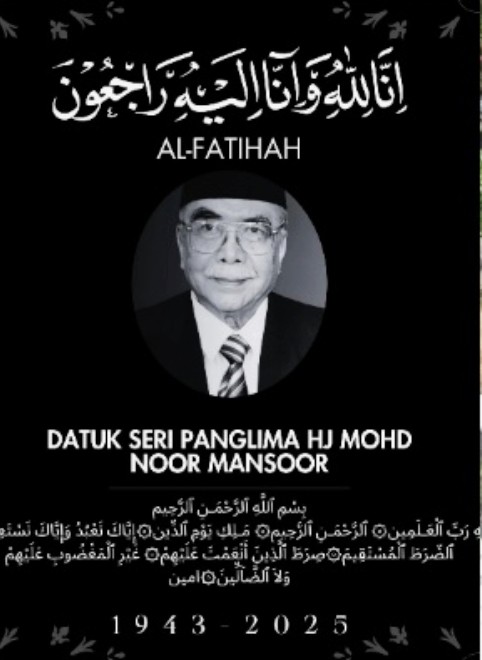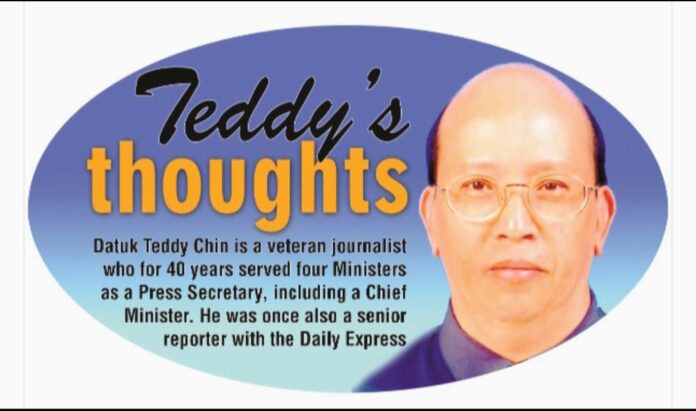By: Datuk Teddy Chin

AN illustrious son of Sabah, Datuk Seri Panglima Mohd Noor Hj Mansoor, passed away at the Queen Elizabeth hospital in Kota Kinabalu on Tuesday morning. In accordance with Muslim tradition, he was buried the same afternoon not far from his house in Putatan.
Matnor (as he was popularly known) came from Kota Belud in the West Coast of Sabah.
The “Cowboy Town”, as its nickname suggests, is famous for its Bajau horsemen who were in demand even at national level celebrations in Kuala Lumpur.
Politically, Kota Belud has produced a Chief Minister in late 1975 in the person of the late Tun Said Keruak who later became a Governor (TYT).
Matnor’s father was a Bajau and his mother Chinese from the Liew family. Matnor’s relatives included the late lawyer-turned politician Datuk VK Liew.
Little is known about Matnor’s childhood and education but he ended up graduating as a lawyer.
I am not sure if he ever served in the Judicial service after graduation but he ended up being appointed as the State Establishment Officer with the status of a Head of Department.
That post was later upgraded to become the Director of the State Civil Service Department. In more recent years, it was further upgraded to be the Director-General.
The holder of this post is seen as a possible successor to be the State Secretary and it has happened before. Another possible successor is the Permanent Secretary of the Finance Ministry.
Matnor was State Establishment Officer when the late Tun Mustapha was Chief Minister during Usno time. Being a lawyer, he was one of the Tun’s blue-eyed boys. At that time, there were very few Bumiputra lawyers, if any.
But the problem was that he was not the only blue-eyed boy of the old man. Matnor’s “competitor” was another former senior civil servant by the name of Dzulkifli.
“Dzul” as he was popularly known was the Tuaran District Officer then. He was a graduate in Political Science from New Zealand, I think. Those days, not many Bumiputras had that kind of qualification.
Dzulkifli’s wife is also a graduate (they probably met in New Zealand) and became Principal of the Tuaran Government Junior Secondary School (now SMK Badin) while Dzul was Tuaran DO. . Among her students wass present Chief Minister Datuk Seri Hajiji Noor.
Normally, the next step for a DO would be a promotion to Kota Kinabalu, probably as a Permanent Secretary or at least his Deputy or Head of some government department.
Mustapha was at the height of his power then. The Usno-led Sabah Alliance party had just won all the 32 State seats uncontested in 1971. During the formation of his new Cabinet, he suddenly transferred Dzul to the State Capital. The icing on the cake was Dzul was made an Assistant Minister to the Chief Minister via appointment as one of the six Nominated Assemblymen.
Sabahans including YBs and heads of department saw the writing on the wall – don’t mess with this “rising star”.
Needless to say, this attracted a lot of jealousy but nobody dares to say a single word. Mind you, the Old Man still had the power of arrest without trial under ISA then.
But why we both Matnor and Dzul the Tun’s blue-eyed boys?
You see, at that time the Tun was President of the Sabah National Youth Association (Sanya), the biggest and most active youth association in Sabah then with branches all over the State. It was powerful and influential just like Sarawak’s Saberkas at one time.
With the Chief Minister at the helm at Sanya, naturally everybody wanted to curry favour with him via Sanya and those holding positions there were seen as the CM’s men.
When Dzul was Tuaran DO, he was active in Sanya. In fact, he was the branch chairman. Those days, entertainment especially at night was limited. So about once a month or whenever there was an excuse, there would be a party at the Tamparuli Sports Club.
Tamparuli was under the Tuaran district, less than 10 miles away.
Social dancing would follow after buffet dinner at the Tamparuli Sports Club which has since been dismantled to make way for the Sedco shophouses.. Those days.
The popular dances were A Go Go, Twist, Cha-Cha and Dendang (later called Joget). I was a teenager and a bandboy then and we would play at such functions.
After a few such functions, even Dzul got to know us personally. We were his Sanya members at the Tamparuli branch too.
After Form 5, my brother and I approached Dzul at the CM’s department for assistance in getting a job. He wrote a note for us to bring to the then Director of Agriculture, a Dr Tsao Yen Tze (forgot the spelling). But the Director wanted us to go to the Ulu Dusun Agriculture Centre near Sandakan to be trained as Agriculture Assistants. We rejected the offer as we did not want to leave Tamparuli and our band.
Around that time there was an election for the post of Deputy Sanya President. In other words, Tun’s No. 2 in Sanya. I forgot why there was a vacancy. I think because Datuk Harris (now Tan Sri) resigned.
Both Matnor and Dzul vied for the post and the competition was tense. Each had their supporters. Matnor’s trump card was those Sanya branch leaders who were civil servants. Dzul’s trump card was he was Assistant Minster to the CM and many hoped to get close to the CM through him. Besides, he got his supporters too since his involvement in Sanya starting from Tuaran.
To be honest, I forgot who won because that was half-a-century ago.
But soon after that Matnor lost his job as the State Establishment Officer for so-called “Misuse of Power”. It was widely reported in the press. Your guess is as good as mine as to what actually happened. I don’t want to speculate.
Pity Matnor but what to do. Politics is dirty, if Sanya could be considered as part of politics. But there is a Malay saying that if you are afraid of waves, don’t live by the sea.
Matnor went into business after that but I don’t have the details. Whether Matnor was angry with Tun for not lifting a finger to help him when he was in trouble, it’s not for me to say.
By 1974 Kuala Lumpur, especially PM Tun Razak, had become increasingly unhappy with how Mustapha ran Sabah, including trying to borrow money from Middle East friends in Saudi Arabia and Libya, which was against federal treasury instructions. He was also trying to buy two jets costing millions of ringgit.
The jets would make it easier for him to travel overseas which he always did. One well known account was how the jet had to return to Kota Kinabalu from London to pick up belacan for his wife.
In order to keep him in check Razak offered him the post of Defence Minister after the 1974 national election. Initially Mustapha agreed on condition that his Assistant Minister Dzulkifli fill the slot. The idea was so he could push all the work to him. So Dzul took office as Deputy Defence Minister in Kl via appointment as Senator, I think.
While he remained Sabah CM, supposedly advised by his close supporters and confidantes including Syed Kechik who originated from Kedah. Razak knew that he was fooled.
In 1975, Razak could no longer tolerate Mustapha as new accusations against him surfaced. He summoned Tun Fuad and Harris and encouraged them to form a new party to fight Usno and, thus, Berjaya was born.
Apart from financial support from KL, Berjaya’s conditions included the release of the ISA detainees and taking away Mustapha’s power of arrest under ISA. As a compromise to continue Usno rule, Mustapha sought the help of his good buddy first PM Tunku Abdul Rahman.
Under the arrangement, Mustapha would step down as CM, which he did in late 1975, handing over to Said Keruak.
But he made sure that his loyalists still controlled the State Cabinet. His brother Datu Aliuddin was made DCM and Dzul was called back from KL to be State Finance Minister. Although Mustapha was no longer CM, Keruak made sure that Mustapha continued to receive the perks protocol-wise including police outriders and bodyguards.
But the Keruak Cabinet didn’t last long. The formation of Berjaya went ahead and Tan Sri Harris himself, in an exclusive to Daily Express Chief Editor James Sarda in the paper’s ground-breaking investigative series on the Double Six tragedy a few years back, revealed for the first time that Razak’s Umno extended RM500,000 to Berjaya as seed money to topple Usno.
In 1975, that was a helluva lot of cash, maybe equivalent to RM5m today. It was the first time in the nation’s political history where a ruling Malay party conspired to bring down another ruling Malay party, i.e. Usno, and replace it with a multiracial party, i.e. Berjaya.
About half a year later, Usno lost to Berjaya. So Matnor eventually succeeded Dzul as Finance Minister though not as immediate successor, with Salleh Sulong in between. What irony and sweet revenge for Matnor against Dzul. One of the first things that Finance Minister Matnor did was to open all the relevant files to see if there was anything that could be used against Dzul including possible corruption.
Dzul was sued by the Finance Ministry and there was a trial involving his Chinese businessman friend. Something to do with purchase of computers I think. I think Dzul never went to jail, but that he and the Chinese friend were fined.
Many of Dzul’s actions did not go down well with the Chinese community like signboards, no fire cracker and no lion dance during CNY. But Mustapha was blamed because he was busy in Beirut, London or Australia, spending time with his orang putih wives or something like that. He once joked in the Star that he had children of all colours. This transpired during a maintenance case brought against him by a Sinhalese woman who engaged Karpal Singh as her lawyer.
I remember DE Chief Editor James telling me that the daughter of this woman sought permission to look through the DE archives for a report and picture it carried of Mustapha with her mother presumably to support inheritance claims
Whether the mother or daughter succeeded I don’t know because James said he told her the DE archives are not for public perusal.
Back to Dzulkifli, he had nothing to do with Matnor’s sacking. Only the Public Service Commission had such power. However, the Chairman of the Commission was Dzul’s father Datuk Abdul Hamid. I leave it to you to form your own conclusion.
Fast forward to 1975, when Parti Berjaya was about to be formed, Harris appointed Matnor as Secretary-General. After all, Matnor was a lawyer and probably had an exe to grind.
In order that Sabahans would not hesitate to support Berjaya, Razak took away Mustapha’s power of arrest and ISA detainees at the “University of Kepayan” were released. Even the State Police Commissioner was changed.
When Berjaya was launched at the now defunct Borneo Hotel by the Tanjung Aru beach on 15th July 1975, Harris was the inaugural President and Matnor secretary-general. Dr James Ongkili who was still a lecturer at the University of Malaya was named a Supreme Council member.
Two weeks later, Tun Fuad stepped down as Governor and took control of Berjaya. Harris became the Deputy President. Tan Sri Yeh Pao Tzu (then Datuk), owner of the Sabah Publishing House which publishes the Daily Express and the Overseas Chinese Daily News, threw his weight behind Berjaya. After Berjaya won Yeh was made a Senator and Member of Parliament.
But, Man Propose God disposes. Usno “forced” two by-elections soon after Berjaya’s birth just to test the strength of the new party. Berjaya lost both by-elections, with Harris himself losing in Labuan.
Then another blow came in January 1976 – Razak died. Tun Hussein Onn (Hishamuddin’s father) took over as PM. Usno still had friends in KL and they managed to convince Hussein Onn to go slow on Usno, pointing out that Mustapha had done a lot for Islam in Sabah, was revered by the State’s Muslims, and Usno’ two by-elections win.
Then the unexpected happened. Just before the snap election called by Usno a couple of months after Razak’s death, out of the blue Matnor was arrested under ISA. He was brought to KL and was kept there for months.
The views expressed here are the views of the writer and do not necessarily reflect those of the Talantang.com

